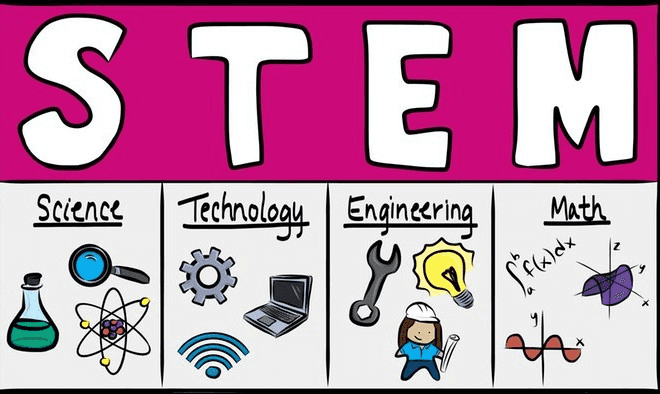STEM: What It Is, Why It Matters, and How to Get Started
Jan 9, 2025
Read: Choosing After-School Programs That Best Fit Your Kids' and Teens' Future: A Parent's Guide to Matching Activities with Interests and Personality
Read: Why Every Teenager Should Learn Coding: Top Benefits for Teens and Parents
Read: What is the Most Popular After-School Activity?
STEM—Science, Technology, Engineering, and Mathematics—has become one of the most essential fields for growth, innovation, and shaping the future. But whether you're a young child just beginning to explore these exciting areas or an adult curious about how to get started, it’s important to understand why STEM matters and how you can dive in at any age.
In this combined guide, we'll take a look at what STEM is, why it's vital, and how it can help children and beginners alike develop crucial skills that benefit not only their education but their personal growth and future careers.
What is STEM?
STEM is an acronym that stands for Science, Technology, Engineering, and Mathematics. Together, these fields form the backbone of modern education and are central to innovation and problem-solving in our world today.
Science explores the natural world, helping us understand everything from the tiniest cells to the vastness of space. It includes disciplines like biology, physics, chemistry, and earth sciences.
Technology refers to the tools and systems we create using scientific knowledge to improve life—everything from smartphones and computers to renewable energy systems and medical technologies.
Engineering involves applying scientific principles to design, build, and improve structures, machines, and systems. Engineers solve practical problems by creating solutions, from bridges to computer programs.
Mathematics is the universal language of STEM, helping us quantify, analyze, and predict outcomes. Whether you're working with numbers, formulas, or data, math is essential to solving problems and understanding the world.
Why is STEM Important?
STEM is more than just a set of subjects—it is a pathway to opportunities. It teaches children and adults alike how to think critically, solve complex problems, and apply knowledge in meaningful ways. Here’s why STEM is so important for both kids and beginners:
It Prepares for the Future: The world is becoming increasingly tech-driven, and STEM careers are growing rapidly. Professions in technology, engineering, healthcare, and data science are some of the most in-demand and well-paid careers worldwide. Whether you're looking for a high-paying job or simply want to stay informed about technological advancements, STEM equips you with skills that will last a lifetime.
It Fosters Critical Thinking and Problem-Solving: STEM teaches how to break down complex problems and develop creative solutions. This ability to think critically and solve real-world problems translates into every area of life, from making informed decisions to troubleshooting everyday challenges.
It Encourages Creativity and Innovation: While STEM involves a lot of logic and reasoning, creativity is at its core. Whether you're designing a new app or solving an engineering problem, STEM encourages innovative thinking and creative solutions that can change the world.
It Builds Confidence and Resilience: Success in STEM, even with small projects, boosts self-esteem. However, it's not just about success—STEM teaches kids and adults to view failure as a part of learning. Working through setbacks builds resilience and fosters a growth mindset, teaching that skills can be developed with effort and persistence.
It Develops Key Life Skills: From collaboration and communication to teamwork and leadership, STEM activities teach children and beginners important life skills. Whether it’s coding a program together or designing a science experiment, working with others in STEM environments improves interpersonal skills, allowing for better communication, cooperation, and problem resolution.
How STEM Helps Kids Grow: Unlocking Potential Early On
For children, STEM education is about more than just academic development—it shapes them into well-rounded individuals with a variety of valuable life skills. Here are some of the ways STEM promotes growth in children:
Fosters Curiosity and a Growth Mindset
Kids are naturally curious, and STEM provides an excellent platform for exploration. By engaging in hands-on STEM activities like building a simple robot or experimenting with chemistry, children learn that curiosity leads to discovery. They also develop a growth mindset, where they understand that intelligence and abilities can grow with practice and learning.Develops Critical Thinking and Problem-Solving Skills
STEM is all about finding solutions. Through projects, kids learn to break down problems, analyze data, and come up with creative ways to solve challenges. This approach helps them tackle obstacles both in and outside of school and builds the foundation for future success in any field.Encourages Collaboration and Teamwork
Many STEM projects require working together with peers. Whether building a model rocket, coding an app, or designing a bridge, kids learn how to communicate, share ideas, and solve problems as a team. These collaborative skills are vital for social development and preparing for real-world careers.Promotes Creativity and Innovation
While STEM often involves logical thinking, it also requires a great deal of creativity. From designing a unique engineering solution to imagining new technologies, kids are encouraged to think outside the box and develop innovative ideas. This fosters creativity and helps them understand that imagination is just as important as logic.Builds Confidence and Self-Esteem
When children succeed in STEM activities, whether it’s solving a complex math problem or completing a project, they experience a sense of accomplishment. Even if they fail or encounter challenges, STEM teaches them that persistence is key. This boosts their confidence, making them more resilient and willing to tackle new challenges.Improves Communication and Literacy Skills
STEM projects often require children to explain their ideas, write reports, or present their findings. This improves their communication and literacy skills, helping them better articulate their thoughts, follow complex instructions, and understand technical concepts.
How Beginners Can Get Started in STEM
Whether you're a child exploring STEM for the first time or an adult curious about diving into these fields, getting started is easier than you think. Here’s how to begin:
Explore What Interests You
STEM is vast, so start with what excites you. Are you fascinated by space? Start with astronomy or physics. Interested in how things work? Dive into engineering. Want to learn how computers work? Try coding or robotics.Take Advantage of Online Resources
There are countless free and affordable online courses and tutorials for beginners. Websites like Khan Academy, Coursera, and edX offer courses for both kids and adults across all STEM disciplines. These platforms make it easy to learn at your own pace, with fun, interactive materials.Start Small and Hands-On
Experimentation is key in STEM. Kids can start with simple science experiments at home, building projects with Lego sets, or using coding platforms like Scratch or Tynker. Beginners can also explore building basic projects using tools like Raspberry Pi or Arduino. These hands-on activities build both technical skills and confidence.Join a Community
Whether online or in person, joining a STEM community can be a huge boost to your learning. There are tons of forums, social media groups, and local clubs where you can share your projects, ask for help, and collaborate with others. Websites like Stack Overflow for coding or Instructables for DIY projects are great places to start.Attend Workshops or Events
Look out for local or virtual STEM workshops, hackathons, or science fairs. These events provide great opportunities to learn, network, and get hands-on experience. They also offer a chance to meet mentors who can guide you through your STEM journey.
Conclusion: Empowering the Innovators of Tomorrow
Whether you’re a young child discovering the wonders of science or a beginner exploring the possibilities of technology, STEM has the power to shape your future. From fostering creativity and problem-solving skills to building confidence and resilience, STEM education nurtures the skills that will be essential in the world of tomorrow.
By introducing kids to STEM early, we’re not just helping them with their homework—we’re equipping them with the tools they’ll need to become the innovators, leaders, and problem-solvers of the future. And for beginners, no matter your age, it’s never too late to start your own STEM journey and discover just how exciting and transformative these fields can be.
So, why wait? Dive into the world of STEM today—whether you're helping a child with a project or embarking on your own learning adventure. The future is waiting!
Read: The Best Ways to Teach Kids Coding in 2025: Expert Tips, Tools, and Methods for Success
Read: Which is the Best Way for Your Teen to Learn Coding in 2025?
Pinecone Coding Academy's Kids Coding Program
At Pinecone Coding Academy, we are passionate about making coding accessible and enjoyable for kids aged 8-17. Our program is designed to inspire and equip young learners with the skills they need to thrive in the digital world.
Click here to discover a coding class that matches your teen's or child's interests.
What We Offer:
Engaging Curriculum: Our courses introduce students to popular programming languages like Python, JavaScript, and HTML/CSS, laying a strong foundation for future learning.
Hands-On Projects: Students participate in project-based learning, creating real applications that they can showcase, from interactive games to personal websites.
Mentorship and Support: Our experienced instructors provide guidance, helping students navigate challenges and discover their coding potential.
Community Connection: By joining Pinecone, students become part of a vibrant community of peers, fostering collaboration and friendship as they learn.
Try a Free Session!
If your child is curious about coding, Pinecone Coding Academy offers a free introductory session for kids aged 8-17. This is a fantastic opportunity to explore programming in a fun and engaging way.
More blogs







